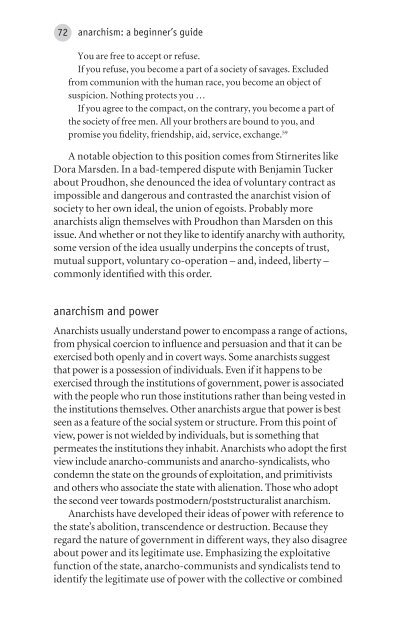o_195qg5dto17o4rbc85q1ge61i84a.pdf
Create successful ePaper yourself
Turn your PDF publications into a flip-book with our unique Google optimized e-Paper software.
72<br />
anarchism: a beginner’s guide<br />
You are free to accept or refuse.<br />
If you refuse, you become a part of a society of savages. Excluded<br />
from communion with the human race, you become an object of<br />
suspicion. Nothing protects you …<br />
If you agree to the compact, on the contrary, you become a part of<br />
the society of free men. All your brothers are bound to you, and<br />
promise you fidelity, friendship, aid, service, exchange. 59<br />
A notable objection to this position comes from Stirnerites like<br />
Dora Marsden. In a bad-tempered dispute with Benjamin Tucker<br />
about Proudhon, she denounced the idea of voluntary contract as<br />
impossible and dangerous and contrasted the anarchist vision of<br />
society to her own ideal, the union of egoists. Probably more<br />
anarchists align themselves with Proudhon than Marsden on this<br />
issue. And whether or not they like to identify anarchy with authority,<br />
some version of the idea usually underpins the concepts of trust,<br />
mutual support, voluntary co-operation – and, indeed, liberty –<br />
commonly identified with this order.<br />
anarchism and power<br />
Anarchists usually understand power to encompass a range of actions,<br />
from physical coercion to influence and persuasion and that it can be<br />
exercised both openly and in covert ways. Some anarchists suggest<br />
that power is a possession of individuals. Even if it happens to be<br />
exercised through the institutions of government, power is associated<br />
with the people who run those institutions rather than being vested in<br />
the institutions themselves. Other anarchists argue that power is best<br />
seen as a feature of the social system or structure. From this point of<br />
view, power is not wielded by individuals, but is something that<br />
permeates the institutions they inhabit. Anarchists who adopt the first<br />
view include anarcho-communists and anarcho-syndicalists, who<br />
condemn the state on the grounds of exploitation, and primitivists<br />
and others who associate the state with alienation. Those who adopt<br />
the second veer towards postmodern/poststructuralist anarchism.<br />
Anarchists have developed their ideas of power with reference to<br />
the state’s abolition, transcendence or destruction. Because they<br />
regard the nature of government in different ways, they also disagree<br />
about power and its legitimate use. Emphasizing the exploitative<br />
function of the state, anarcho-communists and syndicalists tend to<br />
identify the legitimate use of power with the collective or combined




